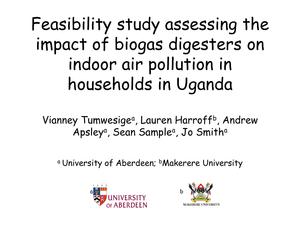Feasibility Study Assessing the Impact of Biogas Digesters on Indoor Air Pollution in Households in Uganda
From energypedia
Revision as of 07:47, 14 May 2014 by ***** (***** | *****)
Feasibility Study Assessing the Impact of Biogas Digesters on Indoor Air Pollution in Households in Uganda
Presenter: Vianney Tumwesige, (University of Aberdeen, Scotland)
Overview
| Inefficient cook stoves are commonly used in Sub-Saharan Africa to burn biomass such as wood and charcoal. The combination of poor kitchen ventilation and incomplete fuel combustion cause elevated exposure levels of fine particulate matter (PM), carbon monoxide (CO), and nitrous oxide (N2O). Biogas produced from anaerobic digesters offer a cleaner alternative cooking fuel. Biogas digesters were installed in nine households in Tiribogo, Uganda as part of a pilot study examining the effects of cooking with biogas on indoor air quality. Fine particulate matter less than 2.5 μm in diameter (PM2.5) and CO were measured before and after digester installation to represent household air quality. Overall, 24-hour average PM2.5 and CO concentrations decreased by 25 and 27 percent, respecitively; however,households with digesters still experienced pollutant exposure exceeding recommended health limits[1]. |
References
- ↑ Feasibility study assessing the impact of biogas digesters on indoor air pollution in households in Uganda. Vianney Tumwesige, Lauren Harroff, Andrew Apsley, Sean Semple and Jo Smith





















